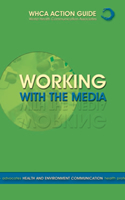 Working with the Media is a handbook designed to help health communicators use the media more effectively and develop new ways of influencing public health policy and practice.
Working with the Media is a handbook designed to help health communicators use the media more effectively and develop new ways of influencing public health policy and practice.
It was written by Mike Jempson (MediaWise), edited by Franklin Apfel and Carinne Allinson (World Health Communication Associates) and reviewed by Tamsin Rose (European Public Health Alliance) and Genon K. Jensen (EPHA Environment Network).
“Our aim in producing this guide,” says Franklin Apfel, Managing Director of WHCA, “is to help health communicators to become more media-wise, to work actively and effectively with the media to advocate for healthier behaviours, choices and policies.”
Chapters include: Media strategy and policy; How the media operate; Press releases; Press conferences; Media interviews; Health communication ethics; Sensitising the media (myths, stigma and discrimination); Risk and crisis communications; and Campaign planning.
The 98-page guide is available for £10 (inc. p&p for UK; overseas rates apply). If you would like a copy please email us.
Foreward by Mike Jempson, MediaWise:
The media play an increasingly powerful role in our lives – especially radio, television and the Internet. The constant cycle of round-the-clock news puts pressure on journalists to produce copy quickly, and often without the benefit of fully investigating material or speaking to the key players. Driven by competitive pressures and tight deadlines, journalists are bound to make occasional mistakes, and when such errors could affect the health and wellbeing of the general public they can be dangerous.
This handbook offers guidance to those who want to help media professionals provide reliable information about public health issues. It is based upon experience from the ‘other side’ of the news desk.
Too often those who seek to influence the media agenda assume that if they supply some basic information, or a dossier of scientific evidence, journalists will do the rest. Mass communications don’t work like that. Especially in the era of interactive media, journalists need personal ‘contacts’ upon whom they can rely for story ideas, accurate information and illuminating ‘quotes’. Even specialist correspondents are expected to cover a wide range of issues, and they cannot be experts on everything.
Health communicators are the experts in their field, and their success in reaching wider publics depends to a considerable extent upon how well they understand how the mass media operate. This handbook provides sufficient background to enable health communicators and their colleagues to design and deliver effective media campaigns. We hope it will also help them to develop new ways of influencing public health policy and practice, and so make their task easier.
Good health!
